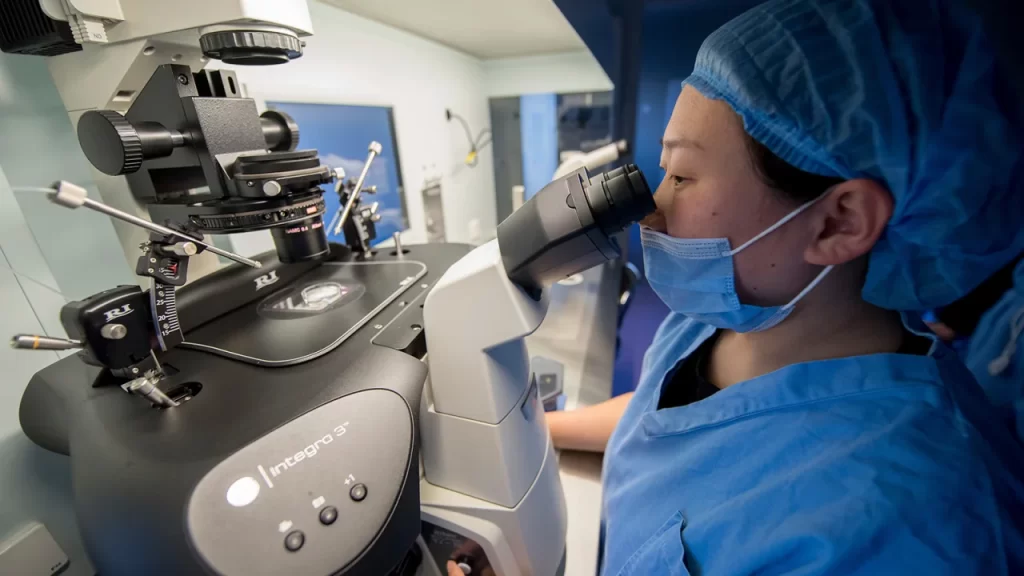Unlocking China’s Genetic Treasure Trove: The Battle for Data Access
The global stage is witnessing a fascinating race in the biosciences, with significant advancements in cancer treatments, longevity research, groundbreaking medicines, and vaccines at stake. China has emerged as a major player in this competition, dedicating substantial resources to establish itself as a leading force. Experts highlight China’s massive population of 1.4 billion people as a potential treasure trove of valuable genetic data, driving the country’s ambition to achieve a preeminent position in the biosciences field.
Vast reservoirs of genetic information are already dispersed across biobanks and research centers throughout China, forming a foundation for groundbreaking discoveries. In response to this wealth of genetic resources, the Chinese government has launched a “national genetic survey” aimed at collecting comprehensive information and strengthening oversight over these vital assets. These efforts, while aiming to bolster China’s position, have also raised concerns about the impact on global research cooperation.
China’s New Regulations: A Double-Edged Sword
The recent implementation of new regulations governing China’s genetic resources, effective from July, signifies the government’s commitment to harnessing its genetic potential. These rules seek to streamline the management of existing genetic data, address the fragmentation in biobanking practices, and foster a more organized approach. However, some experts warn that this centralized control could inadvertently hinder international collaboration, limiting the benefits that can arise from shared genetic knowledge.

Joy Y. Zhang, Director of the Centre for Global Science and Epistemic Justice, cautions that while China’s genetic resources hold immense economic potential, fostering international collaboration is essential to fully realize these benefits. The government’s approach, though well-intentioned, needs to strike a balance between local oversight and global cooperation.
The Biosciences Boom: A High-Stakes Endeavor
China’s focus on the biosciences is driven by the realization of the wide-ranging impact genetic research can have on healthcare, the economy, national defense, and biosafety. The genetic material of its population serves as a valuable asset for studying diseases, developing pharmaceuticals, understanding birth defects, and investigating the factors contributing to longevity. As China grapples with demographic challenges, with a declining birth rate and an aging workforce, unlocking the secrets within its genetic data becomes even more critical.
New research centers are flourishing across China, with biopharmaceutical companies boasting substantial market value. The Chinese government has identified biotechnology as a “strategic emerging industry,” cementing its significance in the country’s long-term development plans. The expansion of China’s genetic database, already considered the world’s largest with over 44 million entries, demonstrates the country’s commitment to leading the way in this transformative field.
Navigating Genetic Sovereignty and Collaboration
As China strengthens its position in the biosciences, it has adopted stringent regulations to protect its genetic resources. These regulations, notably enacted in 2019 and reinforced in the recent rules, aim to prevent the unauthorized collection of Chinese genetic material by foreign entities. While collaborations for research purposes are still allowed, they face increased scrutiny, with foreign and Chinese partners required to obtain government approval and adhere to security reviews.
This approach to safeguarding genetic sovereignty has generated debates about the impact on international scientific cooperation. The United States, in particular, is feeling the pressure to keep up with China’s rapid progress. However, striking a balance between maintaining control and fostering collaboration remains a challenge. The scattered nature of China’s existing genetic databases poses logistical difficulties that the government is actively addressing through the “national genetic survey.”
The Way Forward: Balancing Local Control and Global Collaboration
China’s ambitious strides in biosciences hold immense promise, but the path forward must consider the broader global context. Striking the right balance between protecting genetic resources and enabling international collaboration is essential. While China’s regulations reflect its determination to lead in genetic research, open cooperation and shared data remain vital for advancing scientific frontiers.
The “national genetic survey” represents a significant step in streamlining China’s genetic resources management. By centralizing and standardizing existing data, this initiative aims to overcome the challenges posed by fragmented biobanking practices. However, greater transparency in the scope and methodology of the survey is essential to address concerns about data sharing, privacy protection, and collaboration with international partners.
Ultimately, China’s success in biosciences will be influenced by its ability to navigate the delicate balance between reaping the economic potential of genetic resources and fostering a global collaborative spirit. In a world where scientific advancements thrive on shared knowledge and data, finding common ground is not just an opportunity but a necessity for China to truly become a biosciences superpower.




